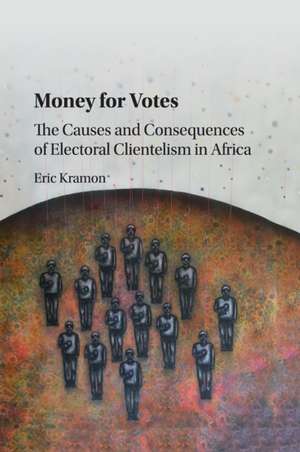Money for Votes: The Causes and Consequences of Electoral Clientelism in Africa
Autor Eric Kramonen Limba Engleză Paperback – 25 mar 2020
| Toate formatele și edițiile | Preț | Express |
|---|---|---|
| Paperback (1) | 284.17 lei 6-8 săpt. | |
| Cambridge University Press – 25 mar 2020 | 284.17 lei 6-8 săpt. | |
| Hardback (1) | 692.00 lei 3-5 săpt. | |
| Cambridge University Press – noi 2017 | 692.00 lei 3-5 săpt. |
Preț: 284.17 lei
Nou
Puncte Express: 426
Preț estimativ în valută:
54.38€ • 56.89$ • 45.17£
54.38€ • 56.89$ • 45.17£
Carte tipărită la comandă
Livrare economică 02-16 aprilie
Preluare comenzi: 021 569.72.76
Specificații
ISBN-13: 9781316645147
ISBN-10: 1316645142
Pagini: 245
Dimensiuni: 230 x 150 x 15 mm
Greutate: 0.37 kg
Editura: Cambridge University Press
Colecția Cambridge University Press
Locul publicării:New York, United States
ISBN-10: 1316645142
Pagini: 245
Dimensiuni: 230 x 150 x 15 mm
Greutate: 0.37 kg
Editura: Cambridge University Press
Colecția Cambridge University Press
Locul publicării:New York, United States
Cuprins
Part I. The Puzzle of Electoral Clientelism: 1. Introduction; 2. Electoral clientelism in Kenya; 3. Theory: electoral clientelism as information; Part II. Empirical Evidence: 4. The mechanics of electoral clientelism: descriptive evidence; 5. Why is electoral clientelism effective? Experimental evidence; 6. Who invests in electoral clientelism? Incumbents versus challengers; 7. Electoral clientelism and ethnic politics; 8. Electoral clientelism and the provision of local public goods; 9. Conclusion.
Notă biografică
Descriere
This book explains why vote buying is common in low-income democracies in Africa, and examines its consequences for democratic accountability.
